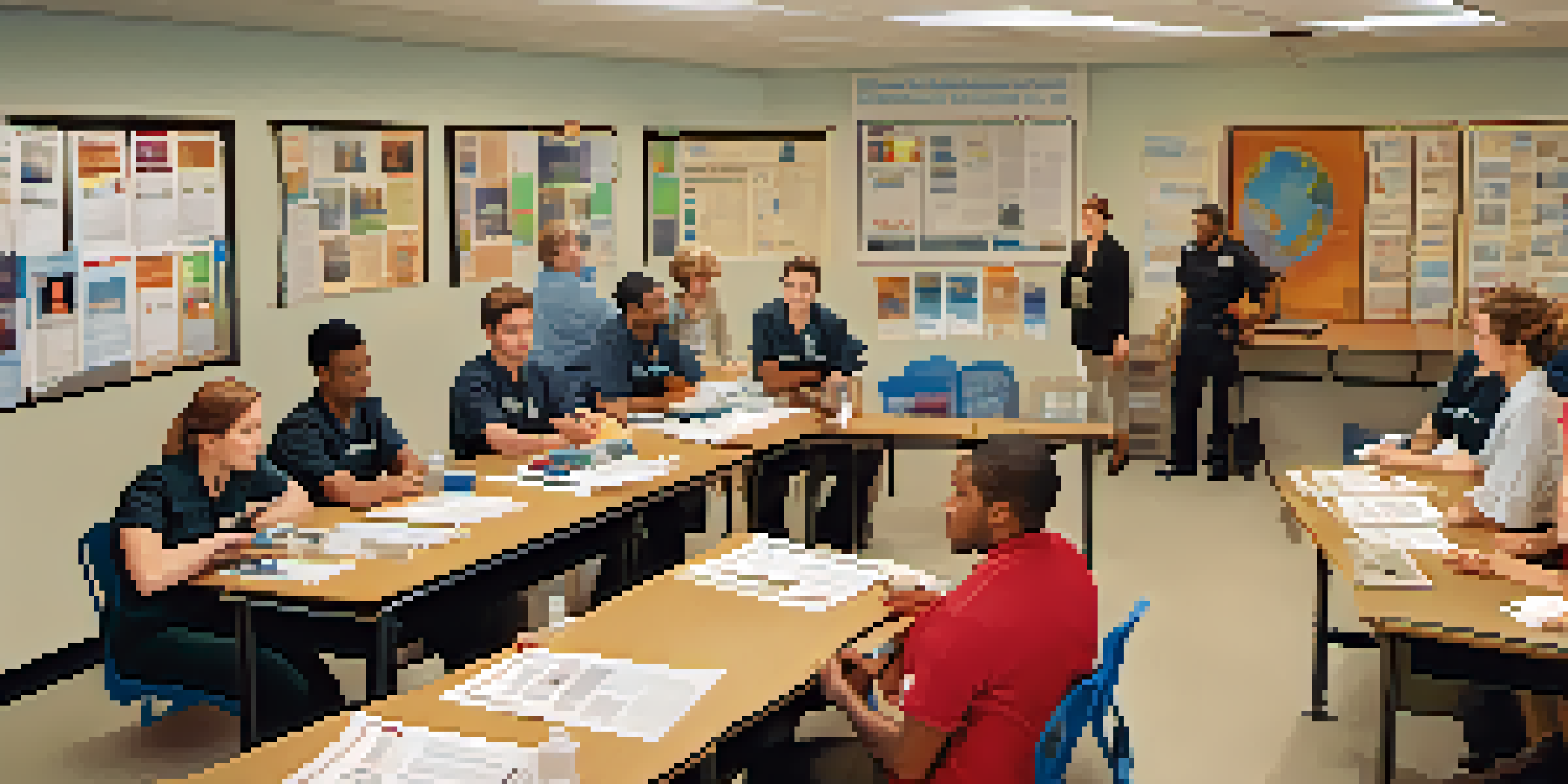Effective Use of Role-Playing in Crisis Intervention Training

Understanding Role-Playing in Crisis Intervention Training
Role-playing is a dynamic training technique that immerses participants in real-life scenarios. By simulating potential crisis situations, trainees can practice their responses in a safe environment. This method helps individuals develop critical thinking and communication skills necessary for effective intervention.
Role-playing allows us to practice our responses in a safe environment, enhancing our skills for real-life situations.
Imagine a firefighter practicing how to respond to a fire in a controlled setting. Just like that, role-playing allows crisis intervention trainees to rehearse their reactions and refine their strategies. The realism of these simulated situations encourages learners to think on their feet and apply theoretical knowledge in practical settings.
Moreover, role-playing fosters empathy and understanding, as participants step into the shoes of both the crisis responder and the affected individual. This dual perspective enhances emotional intelligence, a crucial component in managing crises effectively.
Creating Realistic Scenarios for Effective Training
The effectiveness of role-playing largely hinges on the realism of the scenarios created. Crafting scenarios that reflect true-to-life situations ensures that trainees can relate and apply their learning to actual crises. Collaboration with experienced professionals can help design these impactful scenarios.

For instance, a scenario might depict a mental health crisis involving a young adult. By incorporating specific details and potential outcomes, trainees can explore various intervention techniques. This level of detail not only increases engagement but also prepares participants for the unpredictability of real-life situations.
Role-Playing Enhances Skill Development
This immersive training method allows participants to practice critical skills in realistic scenarios, improving their response capabilities.
Additionally, using feedback from previous trainees can enhance the scenario design process. By understanding what worked well and what didn’t, trainers can continuously refine their approaches, ensuring that each role-playing session remains relevant and effective.
Benefits of Role-Playing in Skill Development
Role-playing is not just about practicing responses; it also facilitates the development of a wide range of skills. Through repeated practice, participants can improve their verbal and non-verbal communication skills, which are vital in crisis situations. This hands-on approach helps solidify these skills in a way that traditional lectures cannot.
Feedback is the breakfast of champions. It is essential for continuous improvement and growth in any skill.
Consider how athletes train for competition. They practice drills repeatedly to build muscle memory and confidence. Similarly, role-playing allows trainees to practice their skills until they become second nature, resulting in more effective interventions when the time comes.
Furthermore, role-playing can also enhance decision-making abilities under pressure. By navigating through these simulated crises, trainees learn to assess situations quickly and choose appropriate responses, a crucial skill in high-stress environments.
Incorporating Feedback for Continuous Improvement
Feedback is an essential component of the role-playing process. After each simulation, discussing what went well and areas for improvement helps participants reflect on their performance. This constructive feedback loop fosters a culture of continuous learning and growth.
For example, if a trainee struggles with de-escalating a tense situation, trainers can provide specific strategies to enhance their approach. This targeted feedback empowers individuals to make adjustments and see immediate results in future scenarios.
Feedback Fuels Continuous Improvement
Constructive feedback after role-playing sessions encourages ongoing learning and helps trainees refine their techniques.
Moreover, peer feedback can also be invaluable. Trainees can share insights and suggestions with one another, creating a supportive environment that encourages collaboration and collective improvement.
Facilitating Emotional Resilience Through Role-Playing
Crisis intervention can be emotionally taxing, making emotional resilience crucial for professionals in the field. Role-playing helps participants confront their feelings and reactions in a controlled setting, allowing them to build coping strategies. This proactive approach can significantly enhance their ability to manage stress in real-life situations.
Think of it as a dress rehearsal before a big performance. By practicing how to handle emotional responses during role-playing, trainees can prepare themselves for the intensity of real crises. This preparation not only boosts confidence but also equips them with tools to maintain composure under pressure.
Additionally, discussing emotional reactions as a group can provide support and foster camaraderie among participants. Sharing experiences and strategies for coping can create a strong support network that proves invaluable in high-stress situations.
Engaging Diverse Learning Styles with Role-Playing
One of the standout benefits of role-playing is its ability to cater to diverse learning styles. Not everyone learns best through traditional lectures; some individuals thrive in interactive and experiential environments. Role-playing allows for kinesthetic learning, where participants engage physically and mentally with the material.
For example, visual learners might benefit from observing role-plays, while auditory learners can engage in discussions afterward. This variety ensures that all participants can connect with the training material in a way that resonates with them.
Catering to Diverse Learning Styles
Role-playing accommodates various learning preferences, making the training more engaging and effective for all participants.
Moreover, incorporating various roles in the exercises allows for a richer learning experience. Each participant can experience different perspectives, enhancing their understanding of the complexities involved in crisis intervention.
Measuring Success: Evaluating Role-Playing Outcomes
To ensure the effectiveness of role-playing in crisis intervention training, measuring outcomes is essential. Trainers can assess participants' skills before and after the training to gauge improvements. These evaluations can include practical assessments, self-reflections, and peer reviews.
For instance, a trainer may observe how a participant’s approach to conflict resolution evolves from the beginning to the end of the training program. Tracking these changes provides valuable data that can inform future training sessions and enhance overall program effectiveness.

Additionally, soliciting feedback from participants about their experiences can yield insights into how role-playing impacted their learning. Understanding what aspects resonated most can help trainers refine their methods and continue to deliver high-quality training.